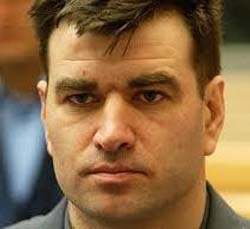OCCRP Chronicles Legija
 He fought beside Arkan, murdered for Milosevic, organized the country’s most violent criminal gang and assassinated a beloved Serbian Prime Minister. Milorad Ulemek Luković also organized two terrorist bombings, killed two opposition leaders in the 1990s at the behest of the government, ran a drug ring and got drunk one night and shot up a discotheque.
He fought beside Arkan, murdered for Milosevic, organized the country’s most violent criminal gang and assassinated a beloved Serbian Prime Minister. Milorad Ulemek Luković also organized two terrorist bombings, killed two opposition leaders in the 1990s at the behest of the government, ran a drug ring and got drunk one night and shot up a discotheque.
The man nicknamed Legija because he once served in the French Foreign Legion has had a hand in some of the most notorious acts in Serbia’s history over the past two decades. And now he will likely spend the rest of his life in a Serbian prison, where he is serving multiple 40-year sentences after racking up the most years behind bars of any Zemun gang member.
Even among Serbia’s criminal elite, Legija stands out because he seemingly operated on both sides of the law, as a member of the government and the country’s mafia. But in reality, his government work was simply a prop and a cover that let him operate as a killer and criminal with virtual impunity, according to hundreds of pages of court records and witness testimonies accumulated by the Organized Crime and Corruption Reporting Project.
In the 1990s Legija worked for the Serbian police as commander of the Special Operations Unit (JSO) known as Red Berets. His government work gave him access to power and money, and made him feared around the country. He also served in the paramilitary unit known as Arkan’s Tigers, which committed atrocities that led to an International Criminal Tribune indictment against Arkan in The Hague.
Legija’s fear that he too would be dragged before the Tribunal – an unfounded fear, as it turned out – also led to his most notorious crime. In early 2003, rumors circulated throughout Serbia’s criminal underworld that Prime Minister Zoran Đinđić would round up Legija’s old gang and turn them over to international prosecutors.
That set off panic among Legija and his associates. In February, 2003, they staged three unsuccessful attempts. Then a month later, a group of more than a dozen people, including mobsters and police officers, conspired to kill the crime fighting Đinđić by shooting him once in the head.
The ensuing public and police reaction was overwhelming and led to dozens of arrests. Eventually Legija was convicted, just one of several murders he now answers for.
Court records compiled by OCCRP detail a vivid reminder of Serbia’s violent gangland murders in the years before and after Milosevic’s downfall. The records also depict a virtual Who’s Who among the country and the region’s most violent gangsters, and offer a colorful insight into a real life drama of killings and treachery.
There were many other high-profile victims of Legija and his associates. A High Court in Belgrade indictment for the assassination of opposition politician Ivan Stambolić and assassination attempt on another opposition leader, Vuk Drašković, named criminals and public figures as defendants, including a former Yugoslavian Army general and a defense minister.
The records assembled also shed light on many of Serbia’s criminal leaders past and present, including Miloš Simović, Branko Berček and Nenad “Rambo” Bujošević, who worked in the State Security Department.
The records and accompanying descriptions provide a fascinating glimpse of Legija’s enormous power, and also illustrate how far Serbia has come since the days when criminals operated with impunity and government leaders who tried to stop them often paid with their lives.
To learn more about this person of interest, see their profile.
